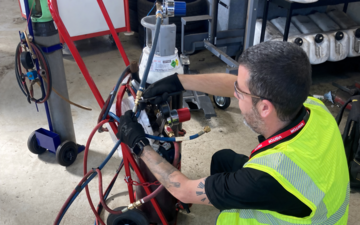- Official BOC UK Online | Industrial Gases | Products & Solutions | BOConline UK
-
Shop
- Industries
- Processes
- Gases & Equipment
-
Solutions
-
Services
-
Health & Safety
-
Contact & Support
- What's Happening
-
Net Zero Strategies
A chat with Gary Moorhouse, Gas Equipment Safety Inspector
Posted by BOC

BOC’s gas equipment safety inspectors spend their time on the road, visiting our customers to ensure that their gas equipment is working properly and is safe to use.
Gary Moorhouse gave us an insight into what customers can expect when he arrives at their door.
What does your job as a gas equipment safety inspector involve?
I’m one of a team of BOC inspectors based throughout the UK, who travel to customer premises on an annual basis to check that their equipment is working correctly.
It’s a little like an MOT inspection – we check all of the different parts connected to their gas cylinders and make sure they’re all safe; replacing any that aren’t in good working order on the spot.
Why is having a gas equipment inspection so important?
It goes without saying that working with gas brings a number of safety risks, so it’s vitally important to ensure that any equipment relating to its use is in good working order. In fact, it’s a legal requirement to ensure that gas equipment used in the workplace is in a safe condition and well maintained.
Gas equipment, like any other equipment, can fail over time and needs regular checks to ensure it is operating correctly. In fact, most gas equipment has a maximum five-year lifespan – meaning that it must be replaced when five years is up, even if it appears to be working properly.
An annual gas equipment inspection is a low-cost way to make sure everything is in working order, and to ensure the safety of your people and premises.
What does an average day look like for you?
All of the gas equipment safety inspectors start from home and a usual day involves a number of inspections at different customer sites. Sometimes customers have one set of equipment, sometimes they have up to 25; it depends on the size of the business and the work they’re undertaking.
I’ll meet with the customer, explain what I’ll be inspecting and then take every piece of equipment in turn and give it a thorough check. I’ll make sure everything’s in date, and run a series of tests, including pressure testing regulators, running reverse tests on flashback arrestors, checking the gas flow through hoses and torches, and checking everything for leaks, blockages and damage.
At the end of the inspection I’ll give the customer a Report of Thorough Examination, and a certificate of inspection. If anything needs replacing, I’ll do it there and then.
Of course, the other part of my job is admin. After every inspection I let the team at BOC know whether the customer has needed any replacement parts to keep on top of our stock, then email the inspection paperwork to the customer and upload it to their account. If they have a BOC online account with us, they can go in and see their certificates and inspection details at any time.
How can your customers ensure they’re more likely to pass an inspection?
Thankfully most of our repeat visits are to customers whose equipment is now up to date, so it’s mostly just a case of looking after it properly – the most important thing is to keep equipment stored well, ensure hoses aren’t coiled too tight, that torches aren’t thrown on the floor (or used as a hammer – something we see quite regularly!), and that regulators are treated with care.
But if equipment does need changing, it’s usually a relatively low-cost item that can be replaced quickly.
One note of caution we always give to customers is to buy good quality equipment – most BOC brand gas equipment comes with a 5-year warranty for peace of mind.
What do you enjoy most about your job?
I’ve worked for BOC in a variety of roles for some years and I always used to be office based – when I first started work as an inspector, I wondered how I’d take to working by myself from home but actually I love the freedom. I get to be out on the road, meeting different people every day, which is really great.
What’s the most unusual thing you’ve seen on an inspection?
On one visit to a customer we found they were using a regulator from 1958! It was a huge thing which weighed around 4 or 5 kilos. We were surprised to find it was still working pretty well, but unfortunately it was out of date and needed replacing – I’m pretty sure that was a record though!
Is your gas equipment due a safety inspection? An annual gas equipment safety inspection from BOC is an easy and cost-effective way to ensure the safety of your people and premises, so book your BOC inspection online now.
